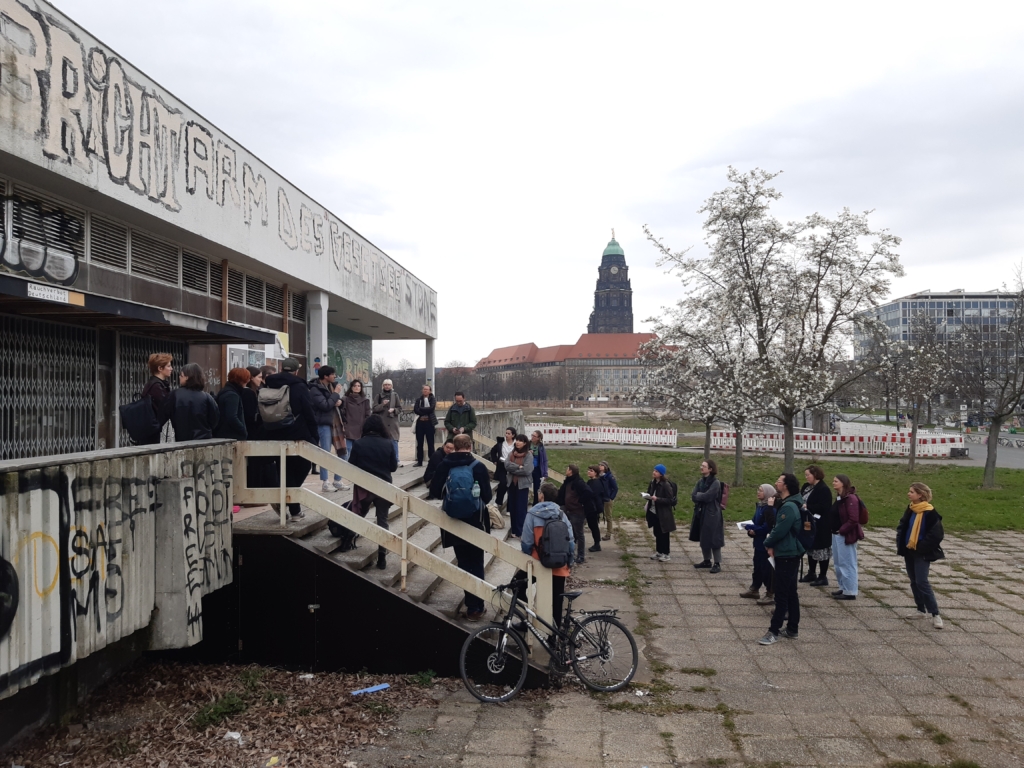Electromagnetic waves envelop and connect us almost everywhere in urban spaces. The “Wireless Walk and Talk” on 19 March 2024 through the city centre of Dresden was designed to make the wireless world more tangible – through our mobile phones, sensing devices, stories and societal resonances.
While we moved through incommensurable worlds of sensing and making sense of 5G, we explored leakages in the context of broader challenges of socio-technical governance: Where can we actually sense emissions and potential leakages of wireless communication networks? How does resistance against hegemonic 5G visions seep into the laboratories where innovators test and present 5G and 6G futures?
Link to the video documentation of the walk on YouTube, see credits below
The three-hour tour started at the Barkhausen Institute Dresden, the participants and the WAVEMATTERS team, had the opportunity to engage with 5G waves through demonstrators that made its existence and latency tangible, e.g. in the form of a air-hockey man-machine interaction.
We then continued our tour through the city, walking with headphones and listening to pre-recorded audio talks about the electromagnetic spectrum by Brett Mommersteeg, about digital sovereignty and ‘Silicon Saxony’ by Alexander Harder and about the former Robotron Canteen by Nona Schulte-Römer. At the time, the Canteen was used by Kunsthaus Dresden as a temporary art space.
After entering the impressive East German modern architecture, we discussed the conflicting societal perspectives on wireless mobile communications technology and ended the walk by exploring the building that was once the heart of the East German IT industry.

March 2024: Tracing social resonances to electromagnetic waves and the past of ‘Silicon Saxony’ at the Robotron Canteen Dresden.
The event was organised by the WAVEMATTERS team for a group of social researchers in the field of Science and Technology Studies and as part of the STSing “Leakage” Conference at TU Dresden.
Behind the Scenes
- Concept “Wireless Walk and Talk”: Nona Schulte-Römer & Brett Mommersteeg
Event organisation: Nona Schulte-Römer & Lisa Hoffmann
Documentary: Lisa Hoffmann, Nona Schulte-Römer & Ignacio Farías
Recording: Lisa Hoffmann (Camera) and Valentin Watermann (Sound)
Editing: Lisa Hoffmann
Non-human actors
Speakers (in the order of their appearance)
Dr. Brett Mommersteeg, Humboldt University Berlin
Prof. Dr. Ignacio Farias, Humboldt University Berlin
Dr. Nona Schulte-Römer, Humboldt University Berlin
Anne Sarah Kraus, Barkhausen Institute Dresden
Dr. Konstantin Klamka, Barkhausen Institute Dresden
Sebastian Vorberg, Barkhausen Institute Dresden
Jan Adler, Barkhausen Institute Dresden
Alexander Harder, Humboldt University Berlin
Participants
- Britta Acksel, Paz Araya, Joachim Allgaier, Patrick Bieler, Milena Bister, Leman Çelik, Catherina Dietrich, Kristiane Fehrs, Maximilian Hepach, Desirée Hetzel, Laura Kocksch, Botagoz Koilybayeva, Stefan Laser, Elisabeth Luggauer, Julie Mewes, Tahani Nadim, Léa Perraudin, Indrawan Prabaharyaka, Irina Rafliana, Regina Sarreiter, Julia Schröder, Estrid Sørensen, Robert Stock, Margherita Tess, Martin Tremčinský, Lenka Vesela, Susann Wagenknecht, Franziska Wolf, Daniela Zetti.
Our special thanks goes to: The organisers of the STSing Conference “Leakage” at TU Dresden, the team at Barkhausen Institute Dresden, Robert Thiele and Kunsthaus Dresden for opening Robotron Kantine for us and the participants of our “Wireless Walk and Talk”